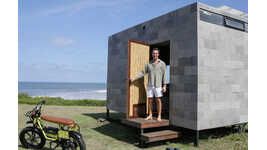The Dezeen x MINI Living Future Urban Home Competition explores the potentials of architecture and UK-based architect Maria Vergopoulou's concept for self-built homes comes in in third place.
The project is dubbed 'Cocoon BioFloss' and is conceived to give individuals the opportunity to grow their own home — quite literally. The concept borders strongly on DIY culture. The construction materials are envisioned to be derived through renewable agricultural by-products. In general, the self-built homes will entertain a pod-like silhouette and will be compromised of "thin bio-plastic fibers, which resemble strands of candy floss." The structures are imagined to be accessible and affordable to individuals.
With her Cocoon BioFloss,' Maria Vergopoulou prepares for a future that is "economically and politically uncertain."
Compact Self-Built Homes
Maria Vergopoulou's Cocoon BioFloss Makes Use of Bio-Plastic Fibers
Trend Themes
1. Compact Self-built Homes - Opportunity for disruptive innovation lies in the development of compact self-built homes using renewable bio-plastic fibers.
2. DIY Culture - The rise of DIY culture presents opportunities for disruptive innovation in the construction industry, particularly in the development of accessible and affordable self-built homes.
3. Renewable Construction Materials - Disruptive innovation opportunities can be found in the use of renewable agricultural by-products for construction materials in self-built homes.
Industry Implications
1. Architecture - The architecture industry can explore disruptive innovation in the development of compact self-built homes using renewable bio-plastic fibers.
2. Construction - Opportunities for disruptive innovation in the construction industry include the development of accessible and affordable self-built homes through DIY culture.
3. Renewable Materials - The renewable materials industry can contribute to disruptive innovation by providing sustainable and renewable agricultural by-products for construction materials in self-built homes.




